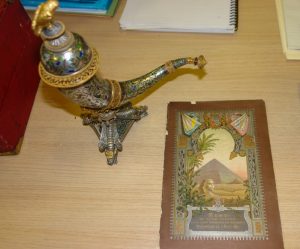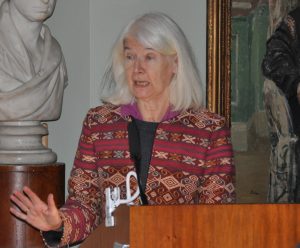More on the Archives…
This week we continue with the story of progress with the archive collections. In the previous blog post I wrote about the original listing of the items in their boxes and something about the Personal Papers. Work continues with the Personal Papers. I have just one volume of the Francis Buchanan-Hamilton collection to clean, so by the end of this week, they should be ready for cataloguing. Our volunteers continue with their work on Dennis Duncanson and on the West brothers, and I am now about 1/3 of the way through the provisional sorting of the A.C. Graham Collection. But that is getting somewhat ahead in the story of sorting the archives…
Once all archives had been identified, work began to separate into the different categories. At this stage most archives were transferred to archival quality boxes and lists were created for each of the different categories. These were:
- Personal Papers
- Royal Asiatic Society Institutional Archives
- Special Collections
- Objects (originally as part of Special Collections and then separated)
Royal Asiatic Society Institutional Archives
Institutional records are organised according to the activities that produce them. So categories were created for:
- Associations with Allied Societies
- Awards and Medals
- Collections
- Finance
- Governance
- Journal
- Lectures and Events
- Membership
- Personnel
- Property
- Publications
- Web and Social Media
As these records were collated in their categories, they were added to individual lists for each section. Further work has also commenced on these records. Items have also been added from material in the Society’s offices which are no longer needed for current activity but important to keep for archival purposes. As record retention schedules are implemented within the archives and across the offices, it also ensures unnecessary records are no longer kept, making the Society compliant with current data protection laws.
This week I will just share about the first couple of categories within the Institutional Records:
Allied Societies
Through its history the Society has made connections with its Allied Societies, but also with other institutions and organisations. The Society was, at one time, a key player in the oriental conference programme including that of the International Congress of Orientalists. Among all the paper records in this category is also this rather wonderful Silver and enamelled drinking horn with its original presentation presented by the King of Sweden to the International Congress of Orientalists held at Stockholm and Christiania in 1889. This horn was deposited for safe-keeping with the Royal Asiatic Society in 1902 and there are further records of the cup being taken to later Congresses by representatives from the Society.

All the material in the Allied Societies section has been catalogued onto Archives Hub, a total of 57 catalogues of various sizes. The material was divided into:
- Royal Asiatic Society Allied Societies RAS ALL1 – RAS ALL13
- Royal Asiatic Society Oriental Conferences RAS OC1 – RAS OC13
- Royal Asiatic Society: International Congress of Orientalists RAS ICO
- Royal Asiatic Society: International Union for Oriental and Asian Studies (International Union of Orientalists) RAS IUO
- Other Societies and Institutions OS1 – OS29
Awards and Medals
The Society, throughout its history, has given, and continues to give, a variety of awards and medals. The records for some of these are now catalogued. These are:
The material for the other awards and medals, contained within the archives, is listed and housed in archival packaging. There will be material in the offices to be added to this as other awards are catalogued as well as some modern electronic records.
More news to follow…
~ ~ ~ ~ ~
On 18 February, the Society was delighted to welcome Dr Fiona Kerlogue (Former Deputy Keeper of Anthropology at the Horniman Musuem) to deliver a lecture on “Travelling and Collecting in the Dutch East Indies in the 1930s: the collections of Růžena Charlota Urbanová in the National Musuem, Prague”. Dr Kerlogue began by providing an overview of the principles and traditions that have historically guided museum science, and how this has informed collecting practices and the documentation of information about objects that enter collections. She also discussed some of the considerations that influence the design of modern museum exhibitions or, as they are sometimes imagined nowadays, “shows”. This helped to frame the fascinating story of the Czech artist Růžena Charlota Urbanová and her collecting habits in the Dutch East Indies in the late 1930s, including her sympathetic interactions with local people, which depended on trade and reciprocal exchange. Urbanová was interned as a result of the Japanese occupation but after her eventual release was able to return to Europe, her collection of material culture becoming part of the Náprstek Museum in Prague. We are very grateful to Dr Kerlogue for sharing this remarkable human story, which has also been documented in her recent publication, Collecting Experience in the 1930s: Růžena Charlota Urbanová and her collection in the Náprstek Museum, Prague, completed with Dagmar Pospíšilová.

Our next event is on Tuesday 25 February from 6.30 pm, when Annabel Teh Gallop will launch her new book, “Malay Seals from the Islamic World of Southeast Asia”. We would like to invite you to join in this celebration and ask that you indicate you intended attendance by emailing Amy Riach at ar@t-creative.com.
~ ~ ~ ~ ~
Looking further ahead, to the summer, we would like to remind you about the second Silk Road Summer School, planned for July 2020. The course is intended for a general audience, no prior knowledge is required. A bibliography will be supplied for those interested in doing some advance reading. The group will be limited to 15 people to allow plenty of time for questions and discussion. The course will explore the term the Silk Road, its history and the 20th century explorations which brought the role of central Asia to the fore. The course will also consider aspects of Silk Road art and technologies including silk production, books and printing, glass, ceramics and metalware, focusing on design and aesthetics travelling along the Silk Road. To register you interest please contact RAS Director, Dr Alison Ohta, at ao@t-creative.com.
Also coming up this summer is the Zoroastrian Summer School 2020 which will take place from the 22nd to 26th June 2020, and will be held at the Norwegian Institute in Rome. This year’s topic is ‘Zoroastrianism: Views of the Future’. Students will be given an intensive learning experience, taught by senior academics from Norway, the UK and Italy. The school is open to undergraduate and postgraduate students, as well as those interested and prepared to undertake the pre-course reading. There are no tuition fees, and only a £40 registration fee for successful applicants. There are four bursaries of £500 to help with the costs of travel and accommodation. The application deadline is the 1st April 2020. In order to apply, please visit the SSPIZS website where you can find more information and download the application form.
